2023年中考英语 动词及动词短语(二) 课件 (共40张PPT)
文档属性
| 名称 | 2023年中考英语 动词及动词短语(二) 课件 (共40张PPT) |
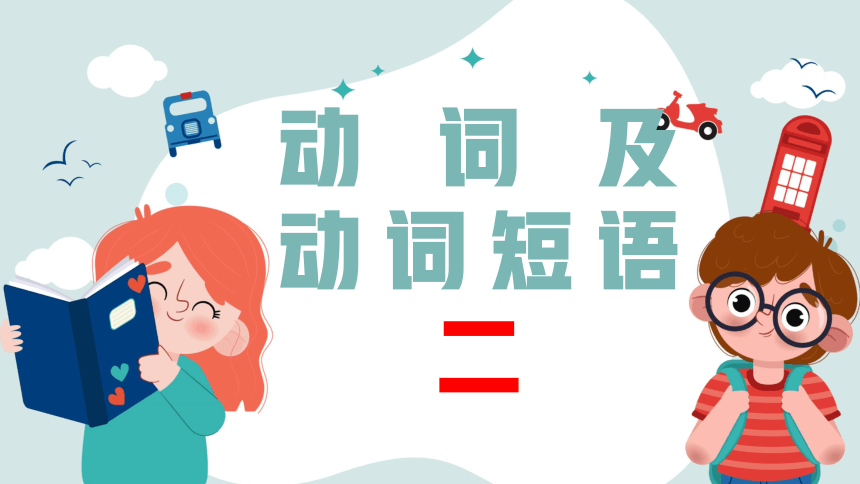
|
|
| 格式 | zip | ||
| 文件大小 | 1.4MB | ||
| 资源类型 | 教案 | ||
| 版本资源 | 通用版 | ||
| 科目 | 英语 | ||
| 更新时间 | 2022-12-19 18:36:13 | ||
图片预览

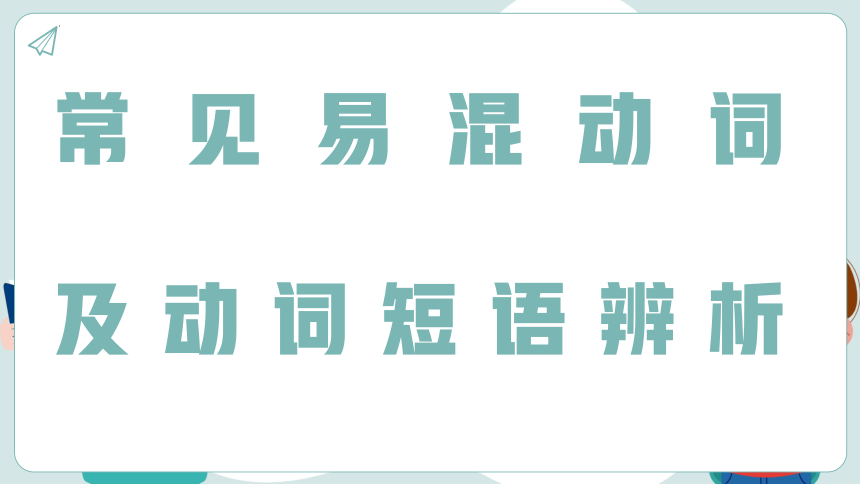
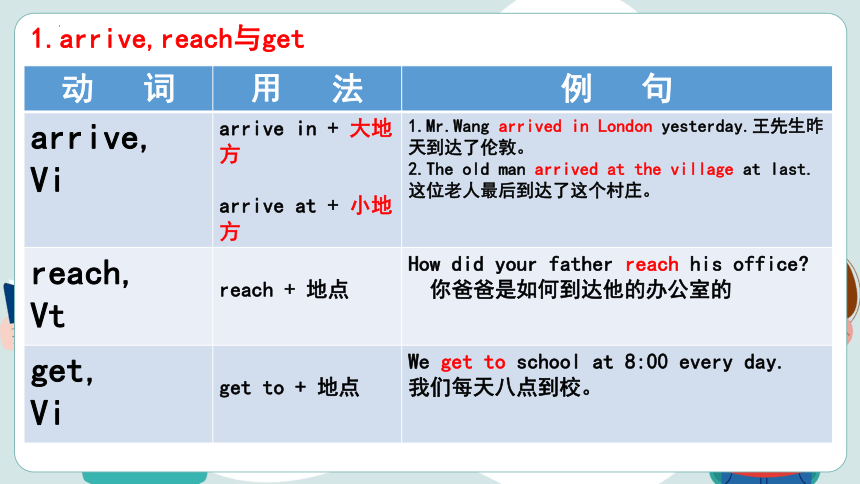
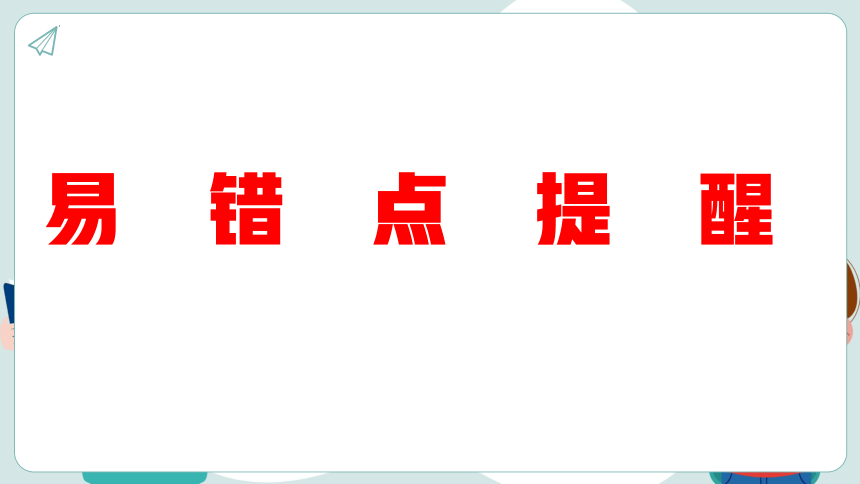
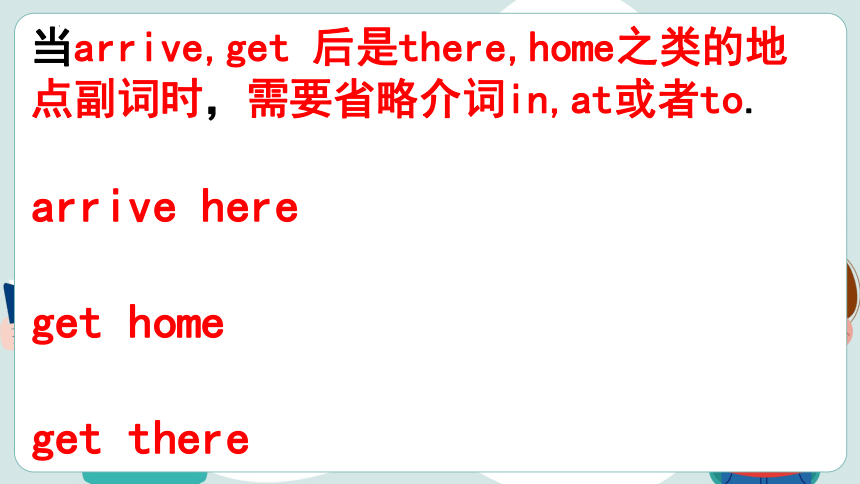
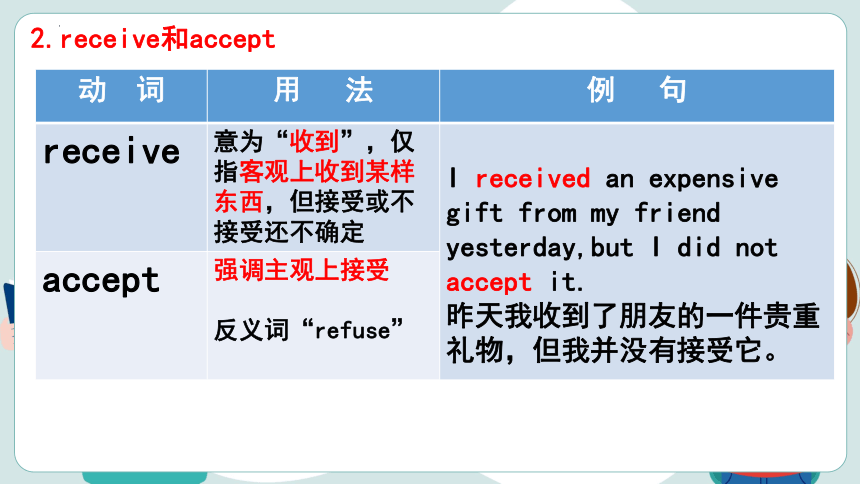
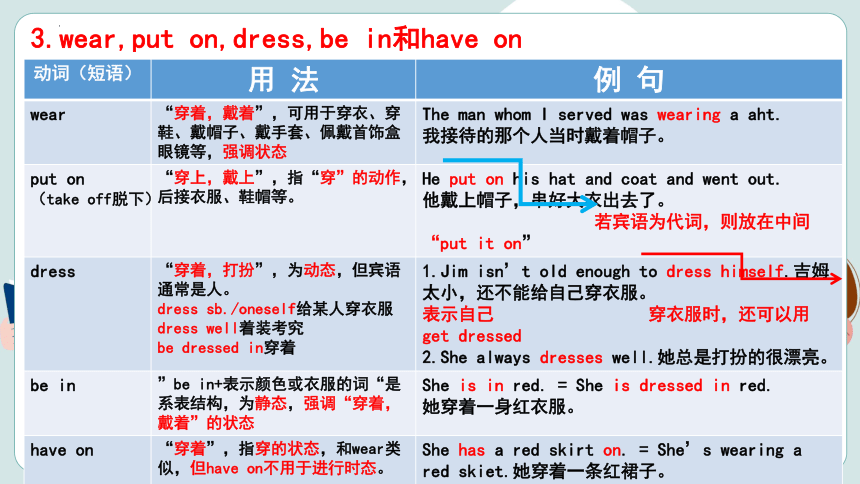

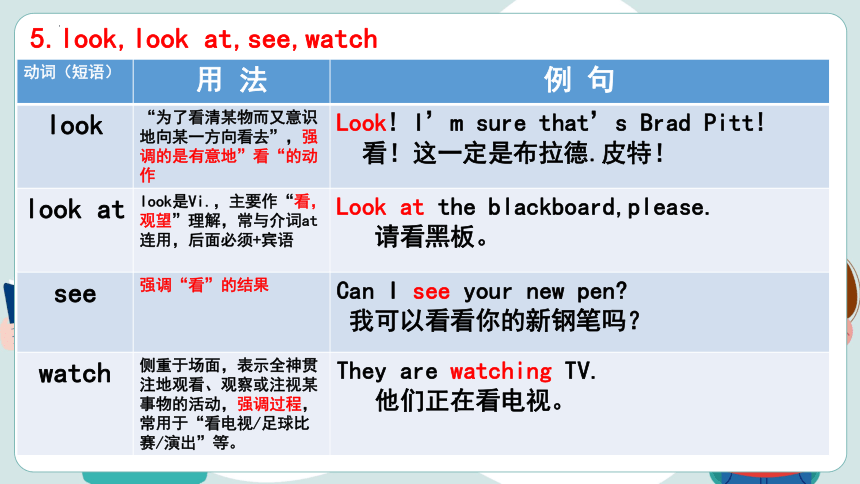
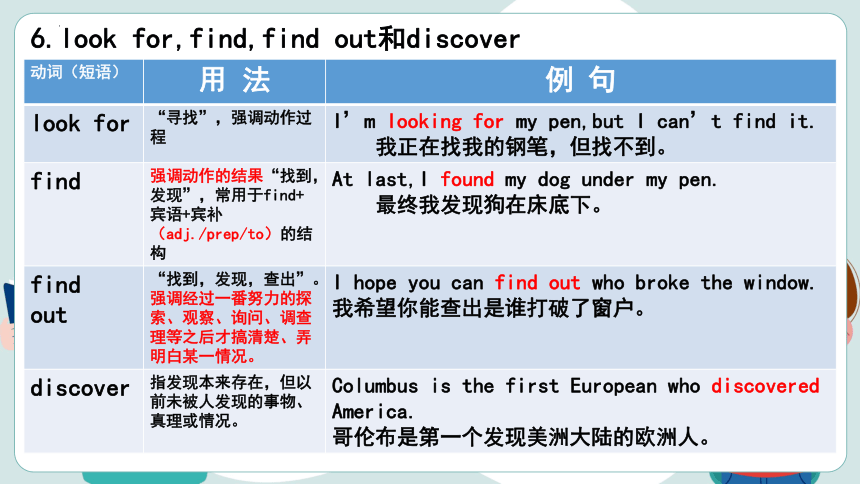
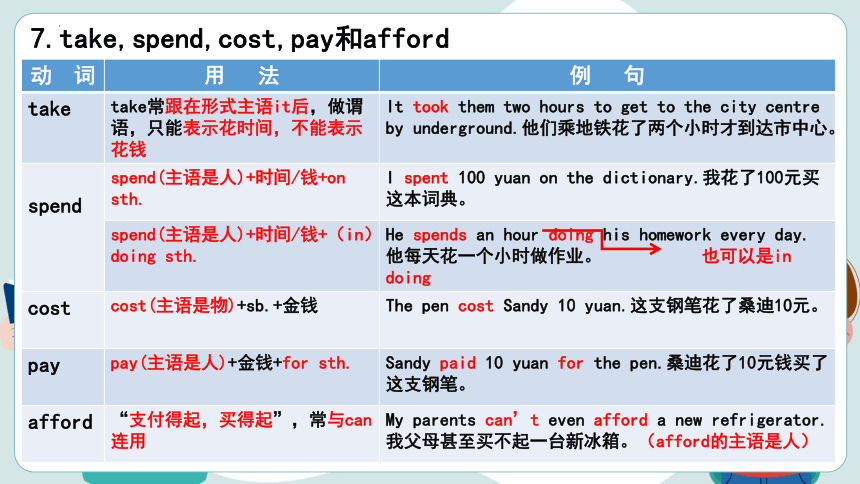
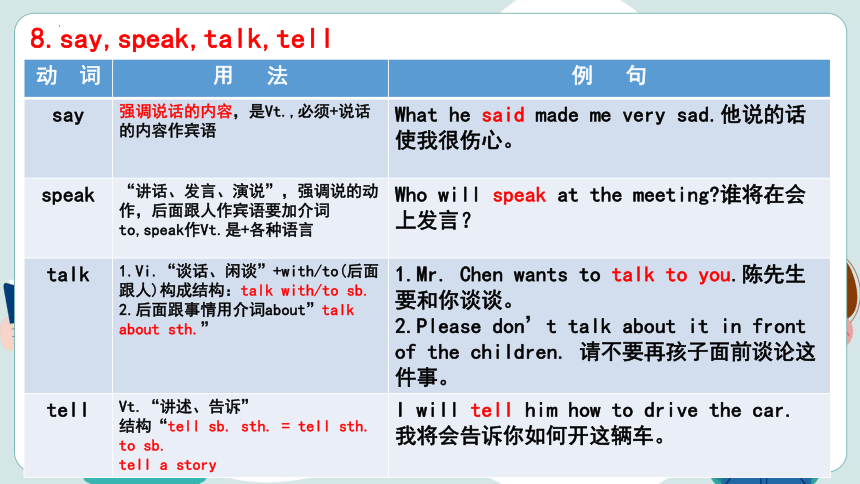
文档简介
(共40张PPT)
动词及
动词短语
二
常见易混动词
及动词短语辨析
1.arrive,reach与get
动 词 用 法 例 句
arrive, Vi arrive in + 大地方 arrive at + 小地方 1.Mr.Wang arrived in London yesterday.王先生昨天到达了伦敦。
2.The old man arrived at the village at last.这位老人最后到达了这个村庄。
reach, Vt reach + 地点 How did your father reach his office
你爸爸是如何到达他的办公室的
get, Vi get to + 地点 We get to school at 8:00 every day.
我们每天八点到校。
易错点提醒
当arrive,get 后是there,home之类的地点副词时,需要省略介词in,at或者to.
arrive here
get home
get there
2.receive和accept
动 词 用 法 例 句
receive 意为“收到”,仅指客观上收到某样东西,但接受或不接受还不确定
I received an expensive gift from my friend yesterday,but I did not accept it.
昨天我收到了朋友的一件贵重礼物,但我并没有接受它。
accept 强调主观上接受 反义词“refuse” 3.wear,put on,dress,be in和have on
动词(短语) 用 法 例 句
wear “穿着,戴着”,可用于穿衣、穿鞋、戴帽子、戴手套、佩戴首饰盒眼镜等,强调状态 The man whom I served was wearing a aht.
我接待的那个人当时戴着帽子。
put on (take off脱下) “穿上,戴上”,指“穿”的动作,后接衣服、鞋帽等。 He put on his hat and coat and went out.
他戴上帽子,串好大衣出去了。
若宾语为代词,则放在中间“put it on”
dress “穿着,打扮”,为动态,但宾语通常是人。 dress sb./oneself给某人穿衣服 dress well着装考究 be dressed in穿着 1.Jim isn’t old enough to dress himself.吉姆太小,还不能给自己穿衣服。 表示自己 穿衣服时,还可以用get dressed
2.She always dresses well.她总是打扮的很漂亮。
be in ”be in+表示颜色或衣服的词“是系表结构,为静态,强调“穿着,戴着”的状态 She is in red. = She is dressed in red.
她穿着一身红衣服。
have on “穿着”,指穿的状态,和wear类似,但have on不用于进行时态。 She has a red skirt on. = She’s wearing a red skiet.她穿着一条红裙子。
4.listen,listen to和hear
动词(短语) 用 法 例 句
listen 表示听的动作 Listen! There is a girl singing outside.
听!外面有个女孩在唱歌。
listen to listen是Vi.,后面如果需要加宾语+to,表示听的动作 She is listening to the music.
她正在听音乐。
hear 表示所听到的结果 I heard your words.
我听到你说的话了。
5.look,look at,see,watch
动词(短语) 用 法 例 句
look “为了看清某物而又意识地向某一方向看去”,强调的是有意地”看“的动作 Look! I’m sure that’s Brad Pitt!
看!这一定是布拉德.皮特!
look at look是Vi.,主要作“看,观望”理解,常与介词at连用,后面必须+宾语 Look at the blackboard,please.
请看黑板。
see 强调“看”的结果 Can I see your new pen
我可以看看你的新钢笔吗?
watch 侧重于场面,表示全神贯注地观看、观察或注视某事物的活动,强调过程,常用于“看电视/足球比赛/演出”等。 They are watching TV.
他们正在看电视。
6.look for,find,find out和discover
动词(短语) 用 法 例 句
look for “寻找”,强调动作过程 I’m looking for my pen,but I can’t find it.
我正在找我的钢笔,但找不到。
find 强调动作的结果“找到,发现”,常用于find+宾语+宾补(adj./prep/to)的结构 At last,I found my dog under my pen.
最终我发现狗在床底下。
find out “找到,发现,查出”。强调经过一番努力的探索、观察、询问、调查理等之后才搞清楚、弄明白某一情况。 I hope you can find out who broke the window.
我希望你能查出是谁打破了窗户。
discover 指发现本来存在,但以前未被人发现的事物、真理或情况。 Columbus is the first European who discovered America.
哥伦布是第一个发现美洲大陆的欧洲人。
7.take,spend,cost,pay和afford
动 词 用 法 例 句
take take常跟在形式主语it后,做谓语,只能表示花时间,不能表示花钱 It took them two hours to get to the city centre by underground.他们乘地铁花了两个小时才到达市中心。
spend spend(主语是人)+时间/钱+on sth. I spent 100 yuan on the dictionary.我花了100元买这本词典。
spend(主语是人)+时间/钱+(in)doing sth. He spends an hour doing his homework every day.
他每天花一个小时做作业。 也可以是in doing
cost cost(主语是物)+sb.+金钱 The pen cost Sandy 10 yuan.这支钢笔花了桑迪10元。
pay pay(主语是人)+金钱+for sth. Sandy paid 10 yuan for the pen.桑迪花了10元钱买了这支钢笔。
afford “支付得起,买得起”,常与can连用 My parents can’t even afford a new refrigerator.我父母甚至买不起一台新冰箱。(afford的主语是人)
8.say,speak,talk,tell
动 词 用 法 例 句
say 强调说话的内容,是Vt.,必须+说话的内容作宾语 What he said made me very sad.他说的话使我很伤心。
speak “讲话、发言、演说”,强调说的动作,后面跟人作宾语要加介词to,speak作Vt.是+各种语言 Who will speak at the meeting 谁将在会上发言?
talk 1.Vi.“谈话、闲谈”+with/to(后面跟人)构成结构:talk with/to sb. 2.后面跟事情用介词about”talk about sth.” 1.Mr. Chen wants to talk to you.陈先生要和你谈谈。
2.Please don’t talk about it in front of the children. 请不要再孩子面前谈论这件事。
tell Vt.“讲述、告诉” 结构“tell sb. sth. = tell sth. to sb. tell a story I will tell him how to drive the car.
我将会告诉你如何开这辆车。
9.bring,take,fetch和carry
动 词 用 法 例 句
bring “带来,拿走”,强调从别处带人或物到说话人所在地。 Next year you may bring your family over from England.明年你可以把你的家属从英国带来。
take “带走,拿走”,强调把人或物带离说话人所在地 Please take these books to the library for me.请把这些书替我带到图书馆去。
fetch “去取来,去拿来”,强调去取东西又返回的这一过程。 Please fetch me the documents in that room.请到那间房间去把那些文件拿来给我。
carry “随身携带”(如搬、提、拿、扛、抬、抱、背、带等),不具体说明来去的方向,有时含有沉重或麻烦之意。 She carried her baby in her arms.她把婴儿抱在怀里。
10.borrow,lend,keep
动 词 用 法 例 句
borrow “借,借入”或“借他人的东西供自己使用”,常与from连用“borrow sth. from sb.” I borrowed a book from Jim.我从吉姆那里借了一本书。
lend “借出”,特指把自己的物品借给他人使用。lend sth. to sb. = lend sb. sth. Jim lent a book to me.=Jim lent me a book.吉姆借给我一本书。
keep “保留、保存”,属于延续性动词,与表示一段时间的状语连用。 You can keep this book for one month.这本书你可以保留一个月。
11.lie,lay
动 词 用 法 例 句
lie 用作规则动词(lied,lied,lied) 时,意为“说谎” She lied to us about heir job.她就她的工作对我们撒了谎。
用作不规则动词(lie,lay,lain)时,“躺,(东西)平放,位于”等意思 1.He felt tired,so he went and lay down for a rest.他感到疲劳,所以去躺下休息了。
2.His books lay open on the desk when I went in.
我进去时,发现他的书平摊在书桌上。
lay 是不规则动词(lay,laid,laid) 是Vt.+宾语,表示“放置,产卵”等多种意思。 The hen is laying an egg.
母鸡在下蛋。
重要提醒
lie意为“说谎“时,可用作n.,而构成短语短语
tell a lie tell lies
“我痛恨说谎话”
可以说“I hate lying.”或“I hate telling lies.”
一般不说“I hate lie.”或“I hate to lie.”
尽管句法正确,但似乎含有“虽然不愿,但仍不得不说谎”之意。
12.win,beat,lose,fail
动 词 用 法 例 句
win “赢得”+比赛、战争或奖品 She loses to an argument.她喜欢在辩论中获胜。
beat “战胜,打败”,其后的宾语可以是人或集体,表示一方赢了另一方。 He beat me at chess.他下棋赢了我。
lose “输”lose to sb. We lost to a stronger team.我们输给了一支实力更强的队。
fail “失败”或“没做成某事” fail to do sth. She failed to get into the art college.她未能进入艺术学院。
13.hope,wish
动 词 用 法 例 句
hope 表达的“希望”是有信心实现的, hope to do sth. hope+that从句 不能说:hope doing sth. hope sb. to do sth. 1.I hope your dream will come true.我希望你的梦想能够实现。
2.I hope that you will become our patron.我希望你将成为我们的靠山。
wish 接不定式:wish to do sth. If you wish to do well,you will do well.如果你希望做好,你就会做好。
接不定式复合结构: wish sb. to do sth. I wish you to be happy.我希望你幸福。
接双宾语:wish sb. sth. I wish you success.祝你成功。
接that从句 用虚拟语气时,that可以省略 I wish (that) I were ten years younger.我希望我能年轻十岁。 用于虚拟语气,that可以省略。
14.join,join in,take part in,attend
动 词 用 法 例 句
join 加入某个党派、团体组织等,成为其成员之一,“参军,入团、入党”等。 When did your elder brother join the army 你哥哥什么时候参军的?
和我某人一道做某事,join sb. in (doing) sth. 根据上下文,in (doing) sth.也可以省去。 1.Will you join us in the discussion 你会参加我们的讨论吗?
2.He’ll join us in singing the song.他将和我们一道唱歌。
join in 多指参加小规模的活动,如“球赛、游戏”等,常用于日常口语 Why didn’t you join in the talk last night 昨晚你为什么没参加座谈?
take part in 指参加会议或群众性活动等, 着重说明句子主语参加该项活动并在活动中发挥作用。 1We often take part in physical labour.我们经常参加体力劳动。
2.We should take an active part in school activities.我们应该积极参加学校活动。
attend Vt.,是正式用语,指参加会议,婚礼,葬礼,典礼,去上课,上学,听报告等;句子的主语只是去听,去看,自己不一定起积极作用。 1.He’ll attend an important meeting tomorrow.他明天要参加一个重要的会议。
2.I attend his lecture.我听力他的讲课。
15.turn on,turn off,turn up,turn down
动 词 用 法 例 句
turn on “打开(电视、收音机、水、煤气等)”,结构为”V.+adv.” Mom,can you help me (to) turn on the TV
妈妈,你可以帮我打开电视吗?
turn off “关闭(电视、收音机、水、煤气等)”,结构为”V.+adv.” You should turn off the light before you go to bed.在睡觉前,你应该关掉电灯。
turn up “开大,调大音量” 反义词:turn down The music is too low.Can you turn the music up 音乐声太小了,你能把它调大一点吗?
turn down “关小,调低音量” 反义词:turn up The music is too noisy.Can you turn it down
音乐太吵了,你能调低一点吗?
易错点提醒
16.be famous for和be famous as
动 词 用 法 例 句
be famous for = be known for... “因......而著名/出名” for后说的是著名/出名的原因 一般用于以某种知识或技能或其他事情而著名/出名的句子中 Yu Qiuyu is famous for his works.
余秋雨因他的著作而著名。
be famous as = be known as “作为......而著名,作为......而闻名” as后面跟的是表示职业的名词,一般用于因职业而著名/出名/闻名的表述 He is famous as a host of HNTV.
他作为湖南卫视的一名主持人而出名。
17.used to do sth.,be used to doing sth.,be used to do sth.
动 词 用 法 例 句
used to do sth. 过去经常做的动作或存在的状态,但现在已经不做/不是了 He used to smoke.他过去经常抽烟。
(意味着现在不抽了)
否定形式: 1.主语+didn’t use to+V原。 2.主语+used not to do sth. You didn’t use to like pop songs.=You used not to like pop songs.你过去不喜欢流行歌曲。
一般疑问句形式: 1.Did +主语+use to+V原+其他? 2.used sb. to do sth. Did you younger sister use to be quite =Used your younger sister to be quite 以前你的妹妹常常是很安静的吗?
可以用在therer be结构中表示“过去经常有”的意思 There used to be a lot of fish in this river.过去这条河里常常有许多鱼。
动 词 用 法 例 句
be used to doing sth. 此结构中,used作adj.”习惯的,”此结构意为“习惯于做某事”。be可以用become,get等来代替。在意义上相当于be accustomed to”习惯于”。同时结构中的to是介词,后面跟n./pron./Ving. Lucy got used to living in the countyrside.
露西已习惯于住在乡村。
be used to do sth. “被用于做某事”,其中used为动词use的过去分词,to 为不定式符号,+V原 The knife is used to cut grass.
这把刀是用来割草的。
不要错用为cutting
18.be made of,be made from,be made into,
be made in,be made by
动 词 用 法 例 句
be made of “由......制成”,从表面能看得出原材料 Bread is made of flour.面包是面粉做的。
(从表面可以直接看得出是面粉做的)
be made from “由......制成”,从表面不能直接看出原材料 Paper is made from wood.纸是由木头做的。
(纸从表面是看不出是由什么做的)
ba made into “被制成......”,主语时材料,后面接具体的物体 Some plants can be made into paper.有些植物可以制成纸。
ba made in “由某地制造,产自哪里”,后接地点 This kind of watch is made in Swiss.这种手表是在瑞士制造的。
ba made by “由......制成”,后面通常接人,用来指出动作的发出者 This paper plane is made by elder brother.这架纸飞机是我哥哥做的。
注意:Made in China(中国制造),它是一个省略句,省略了主语。原型为:It is made in China.
19.have been to,have gone to,have been in
动 词 用 法 例 句
have been to ”去过某地“(现在已经回来了) 常与just,never,ever及表次数的副词连用。 My father has been to Beijing twice.我父亲去过北京两次。
强调过去,但现在不在那里了
have gone to “去离开某地”(还未回来),表示说话的人已不在现场,可能在去目的地的途中,也可能已到达目的地。 Where is Jim He has gone to England.
吉姆在哪里?他去英国了。
意思还没有回来
have been in “待在某地”,表示状态,后接表示时间段的状语 I have been in Shanghai for three years.我到上海已经有三年了。
常和一段时间连用,如句中“for three years”
20.die of,die from
动 词 用 法 例 句
die of 若死因存在于人体之上或之内(主要指疾病、衰老等自身的原因),一般用介词of That old man died 5 years ago and he died of caner.
那位老人五年前就离世了,死于癌症。
die from 若死因不存在于人体之上或之内,而是有环境造成的(主要指事故等方面的外部原因),一般用介词from That old man died 5 years ago and he died from a car accident.那位老人五年前就去世了,死于一场车祸。
常考搭配对象:
die of illness(heart trouble,cancer,a fever,ect.)
死于疾病(心脏病、癌症、发烧等)
die from an earthquake(a traffic accident,a lighting,a stroke,etc.)
死于地震(交通事故,雷击,中风等)
21.take place,happen
动 词 用 法 例 句
take place 表示事先计划好或布置好的事情发生,具有确定性 Great changes have taken place in my hometown.
我的家乡发生了很大的变化。
happen 表示偶然发生或不能预见的事情发生 What happened last night 昨晚发生了什么事情?
当主语是人时,happen意为“碰巧”,结构为:happen to do sth. I happened to see my father on my way home.在回家的路上,我碰巧看到了我的爸爸。
22.forget,leave
动 词 用 法 例 句
forget (考试重点) forget sth.忘记某事 Don’t forget what I said.不要忘记我说过的话。
forget to do sth.忘记要去做某事 I forgot to close the window.我忘记关窗户了。(窗户没关)
forget doing sth.忘记已经做了某事 Grandma forgot closing the door.奶奶忘了她已经关好门了。(已经做过关门的动作了)
leave 与表示地点的状语连用,“遗忘”。 结构为:leave sth.+表示地点的介词,意为“把某物忘在某地” I’ve left my bag on the bus.我把包忘在公交车上了。
表示物品所遗留的地点
23.be good for/at/with/to
动 词 用 法 例 句
be good for “对......有益,对......有好处” 反义词:be bad for Eating more vegetables is good for your health.
多吃蔬菜对你的健康有好处。
be goog at “擅长/精通......”+Ving = do well in 或 be strong in John is good at math.约翰擅长数学。
be good with “善于与......相处,善于应付......” = get on well with He is very good with the children.他与这些孩子相处得很好。
be good to 当后面接sb.“对某人态度友善” =be kind to / be friendly to My grandmother is always good to me.我的祖母(或外祖母)很疼我。
后接+V。 be good to do sth.”做某事是对的” sb. be good to sb.”某人对某人的态度好” It’s good to have an experienced man in the saddle again.
再度让一位有经验的人来掌权是对的。
练 习
( )1. There a bank and two supermarkets on Center Street.
A.have B.has C.is D.are
句意:中心街上有一家银行和两家超市。
【解析】there be句型中的谓语动词遵循“就近一致”原则.就近的是“a bank”,是单数,故用is.
【答案】C
( )2.The strawberries delicious.You can have a try.
A.eat B.drink C.taste D.sound
句意:这些草莓尝起来很可口.
【解析】你可以试试.eat和drink是实义动词,空格后面的delicious是形容词,不能直接作宾语,排除A.B两项;sound意为“听起来”,不符合句意,故选C.
【答案】C
( )3. —We are planning a Yangtze River Protection Day this weekend.Do you have any advice
—You'd better signs around the school to tell all the students about that.
A.make up B.put up C.set up D.show up
【解析】make up意为“组成;编造;化妆”;put up意为“搭建;张贴”;set up意为“成立”;show up意为“显露”。此处表示“在校园里张贴告示”,故选B.
【答案】B
( )4. —I'm sorry I my exercise book at home this morning.
—It doesn't matter.Don't forget it here this afternoon.
A.left;to take B.forgot;bringing
C.left;to bring D.forgot;to bring
句意:——抱歉,我今天早上把我的练习本落在家里了。
【解析】——没关系.别忘了下午把它带来。“leave..at home”意为“把……落在家里”,forget后面不加地点名词:bring意为“带来”.take意为“带走”,故应使用bring.“forget to do sth.”意为“忘记要去做某事”,故第二个空应填to bring.
【答案】C
( )5. —How noisy it is! Could you please the CD player a little
—Sorry,I'll do it at once.
A.turn up B.turn down C.turn off D.turn on
句意:-—太吵了! 你能把播放器的声音关小点吗?—一对不起,我马上就去调.
【解析】turn up 调高(音量).turn down调低(音量),.turn off关掉.turn on打开.根据句意可知B项正确。
【答案】B
( )6. —What Peter like for dinner
—Rice,meat and broccoli.
A.does;eat B.is;eat
C.does;eating D.is;eating
句意:——彼得晚饭喜欢吃什么? ——米饭、肉和西兰花.
【解析】一般现在时中,主语是第三人称单数时,助动词应用does.喜欢做某事“like doing sth.”,故选C.
【答案】C
( )7. If you don't know how to read a new word,you should in a dictionary.
A.look it up B.look up it
C.look for it D.look it for
句意:如果你不知道如何读一个新单词,你应该查词典。
【解析】look up查阅查找,属于“不及物动词+副词”类的动词短语,当代词作宾语时,应该放在动词与副词之间,故选A项.
【答案】A
动词及
动词短语
二
常见易混动词
及动词短语辨析
1.arrive,reach与get
动 词 用 法 例 句
arrive, Vi arrive in + 大地方 arrive at + 小地方 1.Mr.Wang arrived in London yesterday.王先生昨天到达了伦敦。
2.The old man arrived at the village at last.这位老人最后到达了这个村庄。
reach, Vt reach + 地点 How did your father reach his office
你爸爸是如何到达他的办公室的
get, Vi get to + 地点 We get to school at 8:00 every day.
我们每天八点到校。
易错点提醒
当arrive,get 后是there,home之类的地点副词时,需要省略介词in,at或者to.
arrive here
get home
get there
2.receive和accept
动 词 用 法 例 句
receive 意为“收到”,仅指客观上收到某样东西,但接受或不接受还不确定
I received an expensive gift from my friend yesterday,but I did not accept it.
昨天我收到了朋友的一件贵重礼物,但我并没有接受它。
accept 强调主观上接受 反义词“refuse” 3.wear,put on,dress,be in和have on
动词(短语) 用 法 例 句
wear “穿着,戴着”,可用于穿衣、穿鞋、戴帽子、戴手套、佩戴首饰盒眼镜等,强调状态 The man whom I served was wearing a aht.
我接待的那个人当时戴着帽子。
put on (take off脱下) “穿上,戴上”,指“穿”的动作,后接衣服、鞋帽等。 He put on his hat and coat and went out.
他戴上帽子,串好大衣出去了。
若宾语为代词,则放在中间“put it on”
dress “穿着,打扮”,为动态,但宾语通常是人。 dress sb./oneself给某人穿衣服 dress well着装考究 be dressed in穿着 1.Jim isn’t old enough to dress himself.吉姆太小,还不能给自己穿衣服。 表示自己 穿衣服时,还可以用get dressed
2.She always dresses well.她总是打扮的很漂亮。
be in ”be in+表示颜色或衣服的词“是系表结构,为静态,强调“穿着,戴着”的状态 She is in red. = She is dressed in red.
她穿着一身红衣服。
have on “穿着”,指穿的状态,和wear类似,但have on不用于进行时态。 She has a red skirt on. = She’s wearing a red skiet.她穿着一条红裙子。
4.listen,listen to和hear
动词(短语) 用 法 例 句
listen 表示听的动作 Listen! There is a girl singing outside.
听!外面有个女孩在唱歌。
listen to listen是Vi.,后面如果需要加宾语+to,表示听的动作 She is listening to the music.
她正在听音乐。
hear 表示所听到的结果 I heard your words.
我听到你说的话了。
5.look,look at,see,watch
动词(短语) 用 法 例 句
look “为了看清某物而又意识地向某一方向看去”,强调的是有意地”看“的动作 Look! I’m sure that’s Brad Pitt!
看!这一定是布拉德.皮特!
look at look是Vi.,主要作“看,观望”理解,常与介词at连用,后面必须+宾语 Look at the blackboard,please.
请看黑板。
see 强调“看”的结果 Can I see your new pen
我可以看看你的新钢笔吗?
watch 侧重于场面,表示全神贯注地观看、观察或注视某事物的活动,强调过程,常用于“看电视/足球比赛/演出”等。 They are watching TV.
他们正在看电视。
6.look for,find,find out和discover
动词(短语) 用 法 例 句
look for “寻找”,强调动作过程 I’m looking for my pen,but I can’t find it.
我正在找我的钢笔,但找不到。
find 强调动作的结果“找到,发现”,常用于find+宾语+宾补(adj./prep/to)的结构 At last,I found my dog under my pen.
最终我发现狗在床底下。
find out “找到,发现,查出”。强调经过一番努力的探索、观察、询问、调查理等之后才搞清楚、弄明白某一情况。 I hope you can find out who broke the window.
我希望你能查出是谁打破了窗户。
discover 指发现本来存在,但以前未被人发现的事物、真理或情况。 Columbus is the first European who discovered America.
哥伦布是第一个发现美洲大陆的欧洲人。
7.take,spend,cost,pay和afford
动 词 用 法 例 句
take take常跟在形式主语it后,做谓语,只能表示花时间,不能表示花钱 It took them two hours to get to the city centre by underground.他们乘地铁花了两个小时才到达市中心。
spend spend(主语是人)+时间/钱+on sth. I spent 100 yuan on the dictionary.我花了100元买这本词典。
spend(主语是人)+时间/钱+(in)doing sth. He spends an hour doing his homework every day.
他每天花一个小时做作业。 也可以是in doing
cost cost(主语是物)+sb.+金钱 The pen cost Sandy 10 yuan.这支钢笔花了桑迪10元。
pay pay(主语是人)+金钱+for sth. Sandy paid 10 yuan for the pen.桑迪花了10元钱买了这支钢笔。
afford “支付得起,买得起”,常与can连用 My parents can’t even afford a new refrigerator.我父母甚至买不起一台新冰箱。(afford的主语是人)
8.say,speak,talk,tell
动 词 用 法 例 句
say 强调说话的内容,是Vt.,必须+说话的内容作宾语 What he said made me very sad.他说的话使我很伤心。
speak “讲话、发言、演说”,强调说的动作,后面跟人作宾语要加介词to,speak作Vt.是+各种语言 Who will speak at the meeting 谁将在会上发言?
talk 1.Vi.“谈话、闲谈”+with/to(后面跟人)构成结构:talk with/to sb. 2.后面跟事情用介词about”talk about sth.” 1.Mr. Chen wants to talk to you.陈先生要和你谈谈。
2.Please don’t talk about it in front of the children. 请不要再孩子面前谈论这件事。
tell Vt.“讲述、告诉” 结构“tell sb. sth. = tell sth. to sb. tell a story I will tell him how to drive the car.
我将会告诉你如何开这辆车。
9.bring,take,fetch和carry
动 词 用 法 例 句
bring “带来,拿走”,强调从别处带人或物到说话人所在地。 Next year you may bring your family over from England.明年你可以把你的家属从英国带来。
take “带走,拿走”,强调把人或物带离说话人所在地 Please take these books to the library for me.请把这些书替我带到图书馆去。
fetch “去取来,去拿来”,强调去取东西又返回的这一过程。 Please fetch me the documents in that room.请到那间房间去把那些文件拿来给我。
carry “随身携带”(如搬、提、拿、扛、抬、抱、背、带等),不具体说明来去的方向,有时含有沉重或麻烦之意。 She carried her baby in her arms.她把婴儿抱在怀里。
10.borrow,lend,keep
动 词 用 法 例 句
borrow “借,借入”或“借他人的东西供自己使用”,常与from连用“borrow sth. from sb.” I borrowed a book from Jim.我从吉姆那里借了一本书。
lend “借出”,特指把自己的物品借给他人使用。lend sth. to sb. = lend sb. sth. Jim lent a book to me.=Jim lent me a book.吉姆借给我一本书。
keep “保留、保存”,属于延续性动词,与表示一段时间的状语连用。 You can keep this book for one month.这本书你可以保留一个月。
11.lie,lay
动 词 用 法 例 句
lie 用作规则动词(lied,lied,lied) 时,意为“说谎” She lied to us about heir job.她就她的工作对我们撒了谎。
用作不规则动词(lie,lay,lain)时,“躺,(东西)平放,位于”等意思 1.He felt tired,so he went and lay down for a rest.他感到疲劳,所以去躺下休息了。
2.His books lay open on the desk when I went in.
我进去时,发现他的书平摊在书桌上。
lay 是不规则动词(lay,laid,laid) 是Vt.+宾语,表示“放置,产卵”等多种意思。 The hen is laying an egg.
母鸡在下蛋。
重要提醒
lie意为“说谎“时,可用作n.,而构成短语短语
tell a lie tell lies
“我痛恨说谎话”
可以说“I hate lying.”或“I hate telling lies.”
一般不说“I hate lie.”或“I hate to lie.”
尽管句法正确,但似乎含有“虽然不愿,但仍不得不说谎”之意。
12.win,beat,lose,fail
动 词 用 法 例 句
win “赢得”+比赛、战争或奖品 She loses to an argument.她喜欢在辩论中获胜。
beat “战胜,打败”,其后的宾语可以是人或集体,表示一方赢了另一方。 He beat me at chess.他下棋赢了我。
lose “输”lose to sb. We lost to a stronger team.我们输给了一支实力更强的队。
fail “失败”或“没做成某事” fail to do sth. She failed to get into the art college.她未能进入艺术学院。
13.hope,wish
动 词 用 法 例 句
hope 表达的“希望”是有信心实现的, hope to do sth. hope+that从句 不能说:hope doing sth. hope sb. to do sth. 1.I hope your dream will come true.我希望你的梦想能够实现。
2.I hope that you will become our patron.我希望你将成为我们的靠山。
wish 接不定式:wish to do sth. If you wish to do well,you will do well.如果你希望做好,你就会做好。
接不定式复合结构: wish sb. to do sth. I wish you to be happy.我希望你幸福。
接双宾语:wish sb. sth. I wish you success.祝你成功。
接that从句 用虚拟语气时,that可以省略 I wish (that) I were ten years younger.我希望我能年轻十岁。 用于虚拟语气,that可以省略。
14.join,join in,take part in,attend
动 词 用 法 例 句
join 加入某个党派、团体组织等,成为其成员之一,“参军,入团、入党”等。 When did your elder brother join the army 你哥哥什么时候参军的?
和我某人一道做某事,join sb. in (doing) sth. 根据上下文,in (doing) sth.也可以省去。 1.Will you join us in the discussion 你会参加我们的讨论吗?
2.He’ll join us in singing the song.他将和我们一道唱歌。
join in 多指参加小规模的活动,如“球赛、游戏”等,常用于日常口语 Why didn’t you join in the talk last night 昨晚你为什么没参加座谈?
take part in 指参加会议或群众性活动等, 着重说明句子主语参加该项活动并在活动中发挥作用。 1We often take part in physical labour.我们经常参加体力劳动。
2.We should take an active part in school activities.我们应该积极参加学校活动。
attend Vt.,是正式用语,指参加会议,婚礼,葬礼,典礼,去上课,上学,听报告等;句子的主语只是去听,去看,自己不一定起积极作用。 1.He’ll attend an important meeting tomorrow.他明天要参加一个重要的会议。
2.I attend his lecture.我听力他的讲课。
15.turn on,turn off,turn up,turn down
动 词 用 法 例 句
turn on “打开(电视、收音机、水、煤气等)”,结构为”V.+adv.” Mom,can you help me (to) turn on the TV
妈妈,你可以帮我打开电视吗?
turn off “关闭(电视、收音机、水、煤气等)”,结构为”V.+adv.” You should turn off the light before you go to bed.在睡觉前,你应该关掉电灯。
turn up “开大,调大音量” 反义词:turn down The music is too low.Can you turn the music up 音乐声太小了,你能把它调大一点吗?
turn down “关小,调低音量” 反义词:turn up The music is too noisy.Can you turn it down
音乐太吵了,你能调低一点吗?
易错点提醒
16.be famous for和be famous as
动 词 用 法 例 句
be famous for = be known for... “因......而著名/出名” for后说的是著名/出名的原因 一般用于以某种知识或技能或其他事情而著名/出名的句子中 Yu Qiuyu is famous for his works.
余秋雨因他的著作而著名。
be famous as = be known as “作为......而著名,作为......而闻名” as后面跟的是表示职业的名词,一般用于因职业而著名/出名/闻名的表述 He is famous as a host of HNTV.
他作为湖南卫视的一名主持人而出名。
17.used to do sth.,be used to doing sth.,be used to do sth.
动 词 用 法 例 句
used to do sth. 过去经常做的动作或存在的状态,但现在已经不做/不是了 He used to smoke.他过去经常抽烟。
(意味着现在不抽了)
否定形式: 1.主语+didn’t use to+V原。 2.主语+used not to do sth. You didn’t use to like pop songs.=You used not to like pop songs.你过去不喜欢流行歌曲。
一般疑问句形式: 1.Did +主语+use to+V原+其他? 2.used sb. to do sth. Did you younger sister use to be quite =Used your younger sister to be quite 以前你的妹妹常常是很安静的吗?
可以用在therer be结构中表示“过去经常有”的意思 There used to be a lot of fish in this river.过去这条河里常常有许多鱼。
动 词 用 法 例 句
be used to doing sth. 此结构中,used作adj.”习惯的,”此结构意为“习惯于做某事”。be可以用become,get等来代替。在意义上相当于be accustomed to”习惯于”。同时结构中的to是介词,后面跟n./pron./Ving. Lucy got used to living in the countyrside.
露西已习惯于住在乡村。
be used to do sth. “被用于做某事”,其中used为动词use的过去分词,to 为不定式符号,+V原 The knife is used to cut grass.
这把刀是用来割草的。
不要错用为cutting
18.be made of,be made from,be made into,
be made in,be made by
动 词 用 法 例 句
be made of “由......制成”,从表面能看得出原材料 Bread is made of flour.面包是面粉做的。
(从表面可以直接看得出是面粉做的)
be made from “由......制成”,从表面不能直接看出原材料 Paper is made from wood.纸是由木头做的。
(纸从表面是看不出是由什么做的)
ba made into “被制成......”,主语时材料,后面接具体的物体 Some plants can be made into paper.有些植物可以制成纸。
ba made in “由某地制造,产自哪里”,后接地点 This kind of watch is made in Swiss.这种手表是在瑞士制造的。
ba made by “由......制成”,后面通常接人,用来指出动作的发出者 This paper plane is made by elder brother.这架纸飞机是我哥哥做的。
注意:Made in China(中国制造),它是一个省略句,省略了主语。原型为:It is made in China.
19.have been to,have gone to,have been in
动 词 用 法 例 句
have been to ”去过某地“(现在已经回来了) 常与just,never,ever及表次数的副词连用。 My father has been to Beijing twice.我父亲去过北京两次。
强调过去,但现在不在那里了
have gone to “去离开某地”(还未回来),表示说话的人已不在现场,可能在去目的地的途中,也可能已到达目的地。 Where is Jim He has gone to England.
吉姆在哪里?他去英国了。
意思还没有回来
have been in “待在某地”,表示状态,后接表示时间段的状语 I have been in Shanghai for three years.我到上海已经有三年了。
常和一段时间连用,如句中“for three years”
20.die of,die from
动 词 用 法 例 句
die of 若死因存在于人体之上或之内(主要指疾病、衰老等自身的原因),一般用介词of That old man died 5 years ago and he died of caner.
那位老人五年前就离世了,死于癌症。
die from 若死因不存在于人体之上或之内,而是有环境造成的(主要指事故等方面的外部原因),一般用介词from That old man died 5 years ago and he died from a car accident.那位老人五年前就去世了,死于一场车祸。
常考搭配对象:
die of illness(heart trouble,cancer,a fever,ect.)
死于疾病(心脏病、癌症、发烧等)
die from an earthquake(a traffic accident,a lighting,a stroke,etc.)
死于地震(交通事故,雷击,中风等)
21.take place,happen
动 词 用 法 例 句
take place 表示事先计划好或布置好的事情发生,具有确定性 Great changes have taken place in my hometown.
我的家乡发生了很大的变化。
happen 表示偶然发生或不能预见的事情发生 What happened last night 昨晚发生了什么事情?
当主语是人时,happen意为“碰巧”,结构为:happen to do sth. I happened to see my father on my way home.在回家的路上,我碰巧看到了我的爸爸。
22.forget,leave
动 词 用 法 例 句
forget (考试重点) forget sth.忘记某事 Don’t forget what I said.不要忘记我说过的话。
forget to do sth.忘记要去做某事 I forgot to close the window.我忘记关窗户了。(窗户没关)
forget doing sth.忘记已经做了某事 Grandma forgot closing the door.奶奶忘了她已经关好门了。(已经做过关门的动作了)
leave 与表示地点的状语连用,“遗忘”。 结构为:leave sth.+表示地点的介词,意为“把某物忘在某地” I’ve left my bag on the bus.我把包忘在公交车上了。
表示物品所遗留的地点
23.be good for/at/with/to
动 词 用 法 例 句
be good for “对......有益,对......有好处” 反义词:be bad for Eating more vegetables is good for your health.
多吃蔬菜对你的健康有好处。
be goog at “擅长/精通......”+Ving = do well in 或 be strong in John is good at math.约翰擅长数学。
be good with “善于与......相处,善于应付......” = get on well with He is very good with the children.他与这些孩子相处得很好。
be good to 当后面接sb.“对某人态度友善” =be kind to / be friendly to My grandmother is always good to me.我的祖母(或外祖母)很疼我。
后接+V。 be good to do sth.”做某事是对的” sb. be good to sb.”某人对某人的态度好” It’s good to have an experienced man in the saddle again.
再度让一位有经验的人来掌权是对的。
练 习
( )1. There a bank and two supermarkets on Center Street.
A.have B.has C.is D.are
句意:中心街上有一家银行和两家超市。
【解析】there be句型中的谓语动词遵循“就近一致”原则.就近的是“a bank”,是单数,故用is.
【答案】C
( )2.The strawberries delicious.You can have a try.
A.eat B.drink C.taste D.sound
句意:这些草莓尝起来很可口.
【解析】你可以试试.eat和drink是实义动词,空格后面的delicious是形容词,不能直接作宾语,排除A.B两项;sound意为“听起来”,不符合句意,故选C.
【答案】C
( )3. —We are planning a Yangtze River Protection Day this weekend.Do you have any advice
—You'd better signs around the school to tell all the students about that.
A.make up B.put up C.set up D.show up
【解析】make up意为“组成;编造;化妆”;put up意为“搭建;张贴”;set up意为“成立”;show up意为“显露”。此处表示“在校园里张贴告示”,故选B.
【答案】B
( )4. —I'm sorry I my exercise book at home this morning.
—It doesn't matter.Don't forget it here this afternoon.
A.left;to take B.forgot;bringing
C.left;to bring D.forgot;to bring
句意:——抱歉,我今天早上把我的练习本落在家里了。
【解析】——没关系.别忘了下午把它带来。“leave..at home”意为“把……落在家里”,forget后面不加地点名词:bring意为“带来”.take意为“带走”,故应使用bring.“forget to do sth.”意为“忘记要去做某事”,故第二个空应填to bring.
【答案】C
( )5. —How noisy it is! Could you please the CD player a little
—Sorry,I'll do it at once.
A.turn up B.turn down C.turn off D.turn on
句意:-—太吵了! 你能把播放器的声音关小点吗?—一对不起,我马上就去调.
【解析】turn up 调高(音量).turn down调低(音量),.turn off关掉.turn on打开.根据句意可知B项正确。
【答案】B
( )6. —What Peter like for dinner
—Rice,meat and broccoli.
A.does;eat B.is;eat
C.does;eating D.is;eating
句意:——彼得晚饭喜欢吃什么? ——米饭、肉和西兰花.
【解析】一般现在时中,主语是第三人称单数时,助动词应用does.喜欢做某事“like doing sth.”,故选C.
【答案】C
( )7. If you don't know how to read a new word,you should in a dictionary.
A.look it up B.look up it
C.look for it D.look it for
句意:如果你不知道如何读一个新单词,你应该查词典。
【解析】look up查阅查找,属于“不及物动词+副词”类的动词短语,当代词作宾语时,应该放在动词与副词之间,故选A项.
【答案】A
同课章节目录
- 词法
- 名词
- 动词和动词短语
- 动词语态
- 动词时态
- 助动词和情态动词
- 非谓语动词
- 冠词
- 代词
- 数词和量词
- 形容词副词及其比较等级
- 介词和介词短语
- 连词和感叹词
- 构词法
- 相似、相近词比较
- 句法
- 陈述句
- 一般疑问句和否定疑问句
- 特殊疑问句及选择疑问句
- 反意疑问句
- 存在句(There be句型)
- 宾语从句
- 定语从句
- 状语从句
- 主谓一致问题
- 简单句
- 并列句
- 复合句
- 主谓一致
- 主、表语从句
- 名词性从句
- 直接引语和间接引语
- 虚拟语气
- 感叹句
- 强调句
- 倒装句
- 祈使句
- 句子的成分
- 句子的分类
- 题型专区
- 单项选择部分
- 易错题
- 完形填空
- 阅读理解
- 词汇练习
- 听说训练
- 句型转换
- 补全对话
- 短文改错
- 翻译
- 书面表达
- 任务型阅读
- 语法填空
- 其他资料
